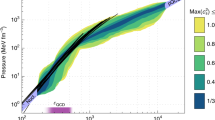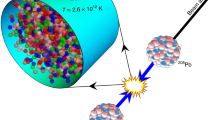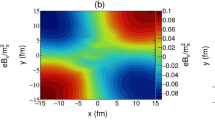Abstract
Because nucleons are bound states of quarks, nuclear matter should at sufficiently high density become a quark plasma. Assuming quantum chromodynamics as the basic theory of nuclear forces, it is possible to derive strong-interaction thermodynamics and study the nature of this transition. Predictions of thermodynamic variables are obtained by computer simulation; they provide the first theoretical information on the phase structure of strongly interacting matter. The experimental search for the quark plasma is beginning this year at Brookhaven and at CERN. Energetic nuclear collisions could produce sufficiently dense and long-lived strongly interacting systems to allow a first look at the predicted new state of matter.
This is a preview of subscription content, access via your institution
Access options
Subscribe to this journal
Receive 51 print issues and online access
$199.00 per year
only $3.90 per issue
Buy this article
- Purchase on Springer Link
- Instant access to full article PDF
Prices may be subject to local taxes which are calculated during checkout
Similar content being viewed by others
References
Mott, N. F. Proc. phys. Soc. A62, 416–422 (1949).
Mott, N. F. Rev. mod. Phys. 40, 677–683 (1968).
Fritzsch, H., Gell-Mann, M. & Leutwyler, H. Phys. Lett. 47B, 365–368 (1973).
Weinberg, S. Phys. Rev. Lett. 31, 494–497 (1973).
Gross, D. J. & Wilczek, F. Phys. Rev. D8, 3633–3652 (1973).
Yang, C. N. & Mills, R. L. Phys. Rev. 96, 191–195 (1954).
Wilson, K. Phys. Rev. D10, 2445–2459 (1974).
Creutz, M. Phys. Rev. D21, 2308–2315 (1980).
Satz, H. A. Rev. nucl. Part. Sci. 35, 245–270 (1985).
K., Binder (ed.) Monte Carlo Methods in Statistical Physics (Springer, Berlin, 1979).
Metropolis, N., Rosenbluth, A. W., Rosenbluth, M. N., Teller, A. H. & Teller, E. J. chem. Phys. 21, 1087–1092 (1953).
Çelik, T., Engels, J. & Satz, H. Nucl. Phys. B256, 670–686 (1985).
Kogut, J., Polonyi, J., Wyld, H. W., Shigemitsu, J. & Sinclair, D. K. Phys. Rev. Lett. 53, 644–647 (1984).
Engels, J. & Satz, H. Phys. Lett. 159B, 151–154 (1985).
Berg, B., Engels, J., Kehl, E., Waltl, B. & Satz, H. Z. Phys. C31, 167–174 (1986).
Kajantie, K. (ed.) Quark Matter 1984, Lecture Notes in Physics no. 221 (Springer, Berlin, 1985).
Bjorken, J. D. Phys. Rev. D27, 140–151 (1983).
Baym, G. Quark Matter 1984, Lecture Notes in Physics no. 221 (ed. Kajantie, K.) 39–52 (Springer, Berlin, 1985).
Van Hove, L. Phys. Lett. 118B, 138–140 (1982).
Miyamura, O. Quark Matter 1984, Lecture Notes in Physics no. 221 (ed. Kajantie, K.) 187–195 (Springer, Berlin, 1985).
Gyulassy, M. Nucl. Phys. A418, 59c–85c (1984).
Matsui, T. & Satz, H. Phys. Lett. 178, 416–422 (1986).
Author information
Authors and Affiliations
Rights and permissions
About this article
Cite this article
Satz, H. The quark plasma. Nature 324, 116–120 (1986). https://doi.org/10.1038/324116a0
Issue Date:
DOI: https://doi.org/10.1038/324116a0
This article is cited by
-
q % MathType!MTEF!2!1!+- % feaafiart1ev1aaatCvAUfeBSjuyZL2yd9gzLbvyNv2CaerbuLwBLn % hiov2DGi1BTfMBaeXatLxBI9gBaerbd9wDYLwzYbItLDharqqtubsr % 4rNCHbGeaGqiVy0df9qqqrpepC0xbbL8F4rqqrFfpeea0xe9Lq-Jc9 % vqaqpepm0xbba9pwe9Q8fs0-yqaqpepae9pg0FirpepeKkFr0xfr-x % fr-xb9adbaqaaeGaciGaaiaabeqaamaabaabaaGcbaGabmyCayaara % aaaa!365D! \( \bar q \) pair production in non-Abelian gauge fields
Pramana (2007)
-
Growing drops of strange matter
Nature (1989)
-
The physics of dense nuclear matter from supernovae to quark gluon plasma
Nature (1989)
Comments
By submitting a comment you agree to abide by our Terms and Community Guidelines. If you find something abusive or that does not comply with our terms or guidelines please flag it as inappropriate.



